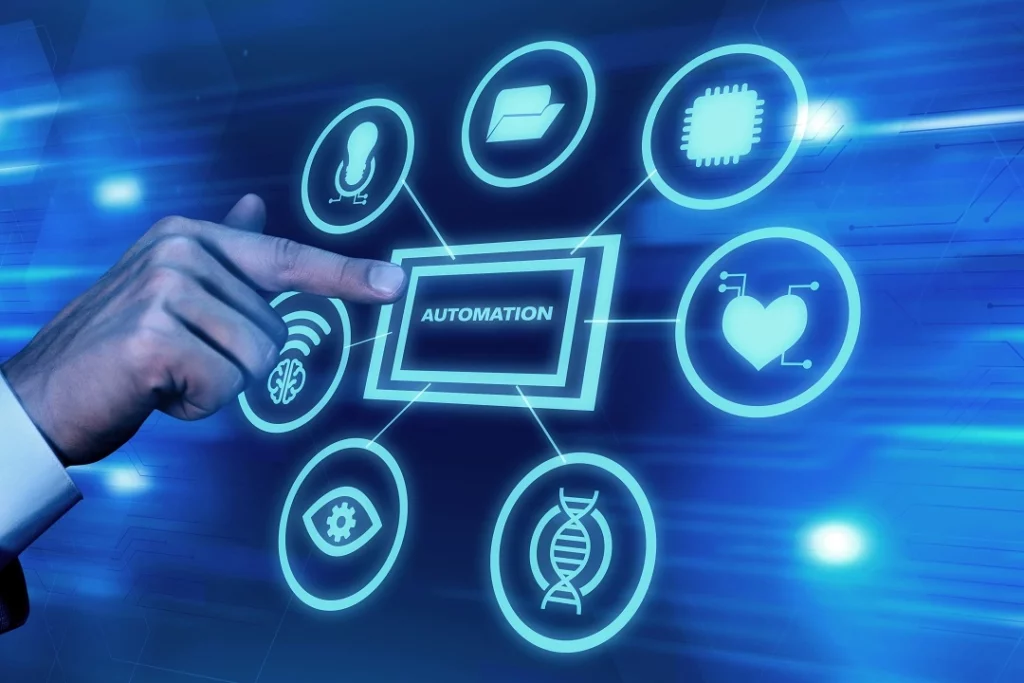AI-Powered Automation: Boosting Productivity and Efficiency
Artificial intelligence (AI) is transforming the way businesses run in the modern corporate environment, therefore greatly increasing output and efficiency. From manufacturing floors to distribution centers and office buildings, artificial intelligence-powered automation is increasingly important in simplifying processes and cost-cutting potential. This essay explores how intelligent systems, robotic automation, and machine learning algorithms—among other AI technologies—are changing corporate processes. We will discuss the major influence of artificial intelligence on manufacturing, logistics, and office management, stressing how these technologies are not only improving processes but also changing the nature of employment going forward.

AI automation in manufacturing
Modern manufacturing now revolves on artificial intelligence (AI), which permeates closely into processes to improve output and efficiency. Predictive maintenance—where systems forecast faults and arrange repairs without human involvement—is made possible by artificial intelligence technology including machine learning algorithms, therefore reducing downtime. Robotic automation has also developed to not only do monotonous chores but also to use real-time data analysis to adapt to changing situations.
For instance, Tesla’s Fremont, California, plant uses a wide range of robots combined with artificial intelligence to boost precision and car output rates. Comparably, General Electric uses AI-driven robotic systems to maximize the assembly of intricate machinery components, therefore lowering manufacturing times and greatly reducing costs. These systems show how artificial intelligence automation improves quality, lowers running costs, and accelerates manufacturing techniques.
AI in Logistics and Supply Chain
AI is very important in the logistics and supply chain sectors in terms of operation simplification and decision-making enhancement. Predicting future patterns by means of predictive analytic, artificial intelligence systems examine past data, therefore enabling businesses to better control inventory and lower holding costs. For example, Amazon employs predictive analytic to project consumer demand and modify stock levels, therefore optimizing warehouse operations and enhancing delivery times.
Another usage of artificial intelligence is autonomous cars, which are utilized in delivery and warehouse operations; Amazon uses self-driving forklifts in their fulfillment facilities and drones for last-mile delivery. Along with accelerating the logistical procedures, these AI-driven developments have improved accuracy and lower human error. One of the top logistics firms in the world, DHL, has a case study showing how using artificial intelligence in supply chain management led to a 15% increase in delivery efficiency and a notable drop in fuel costs by means of load and route optimization.
Automating Office Tasks with AI
Routine office chores are being automated with artificial intelligence, therefore greatly improving efficiency and lowering human error. In data entry, artificial intelligence tools such as OCR (Optical Character Recognition) and NLP (Natural Language Processing) technology convert handwritten or typed documents into digital data with great accuracy, therefore reducing the need for manual input. By means of participant communication, optimal time selection, and calendar updating devoid of human involvement, scheduling software combined with artificial intelligence—like x.ai and Clara—automates meeting planning. AI-powered chatbots like Drift and Intercom give quick answers to consumer questions, therefore greatly improving response times and customer satisfaction in customer correspondence. These AI-driven technologies not only save a lot of time but also lessening of human mistake scope, which simplifies office operations.
Challenges and Ethical Considerations

AI-driven automation presents ethical questions and problems even if it has many advantages. The possible displacement of occupations as artificial intelligence systems complete tasks typically performed by people presents a significant obstacle requiring workforce retraining and the acquisition of new skill sets.
Since these systems may handle vast volumes of private data, ethically the use of artificial intelligence presents questions with data privacy. First and most importantly is maintaining the security and anonymity of this material. Furthermore, the opaque decision-making process of artificial intelligence systems can cause problems with responsibility should mistakes arise. Organizations must take strong governance frameworks and guarantee that artificial intelligence systems are built with justice and transparency in mind if they are to handle these ethical issues.
Conclusion
In terms of how companies maximize operations and interact with their surroundings, artificial intelligence-powered automation marks a major revolution. Companies can reach hitherto unheard-of degrees of efficiency and productivity by including artificial intelligence throughout office operations, logistics, and manufacturing, therefore saving costs and improving performance.
As we welcome these developments, though, it is imperative to also address the underlying issues and ethical questions such employment displacement, data privacy, and artificial intelligence decision transparency. Maintaining trust and justice in AI-driven systems depends on responsible deployment and continuous modification to these technologies being able to realize their full potential. Looking ahead, the constant innovation and careful integration of artificial intelligence automation will surely define the next phase of corporate efficiency most importantly.



